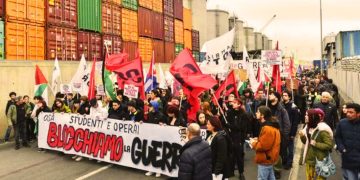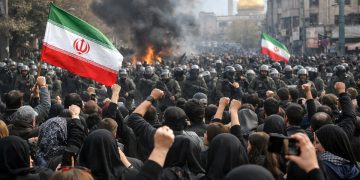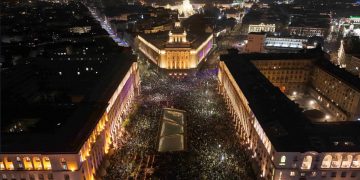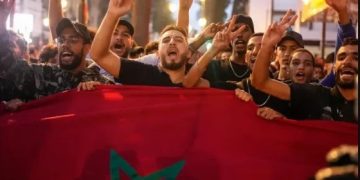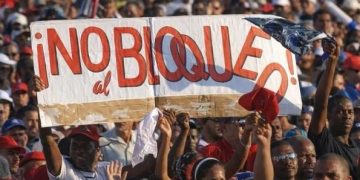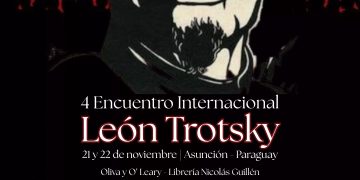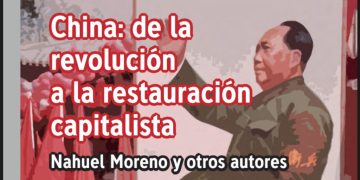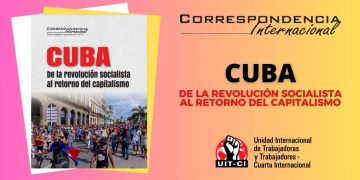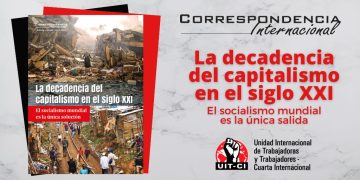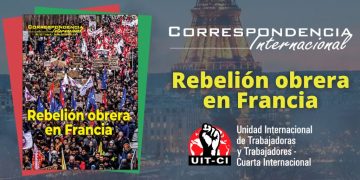When the Berlin Wall fell, and before long the governments of inappropriately named «socialist camp» (former USSR, Romania, Poland, Czechoslovakia, etc.), the capitalists of the world celebrated what for them was the historic triumph of capitalism as a superior system. They went so far as to say «the class struggle is over, we won» and proclaimed the end of history.
The revolutionary socialists have another interpretation of what happened. Firstly, because what existed in those countries was not socialism or anything similar: there were dictatorial one-party governments, there was no freedom of speech, press, to form parties, unions or to strike. The extraordinary achievements of workers since the 1917 Russian revolution, as were the expropriation of the bourgeoisie, the planned economy, nationalization and control of foreign trade, full employment, quality education and health services, etc., from the 1920s were being disfigured and finally given up by the Stalinist bureaucracy, who always and first of all defended their privileges of bureaucrats making pacts with imperialism.
A reference of these covenants is the Yalta and Potsdam agreements established after World War II. In them, Churchill (UK), Roosevelt (U.S.) and Stalin divided the world and agreed to peaceful coexistence. For this, the Kremlin bureaucracy pledged to avoid or betray any new socialist revolution in the world. The new expropriations achieved since the war were strait jacketed from birth by the bureaucracies.
Beginning in 1989, as large mobilizations of masses, workers and youth brought down the Wall and popular insurrections what ended dictatorships, and because with the end these governments the world’s largest counter-revolutionary apparatus that were the bureaucratic communist parties — and simultaneously, the Yalta and Potsdam agreements — were wiped out, we consider these events as positive, as revolutionary historical victories of the mass movement.
The Kremlin served as the principal ally of imperialism for all those years, to defeat the uprisings of the labour and mass movement around the world. Until 1989, imperialism appealed to the weight of the CP in Moscow and its allies to stop, divert and betray the revolutions, preventing them from reaching new socialist successes and governments of the workers which expropriated the bourgeoisie in their countries. They thus prevented, for example, that there were new Cubas in Latin America, helping to leave in the field of capitalism the revolutions of Nicaragua or El Salvador. And in Europe, they played a similar role in the French May of 1968 or in the revolution of Portugal of 1974. Or in Arab countries they supported the dictatorial regimes of Gaddafi, Mubarak or Bashar al-Assad. Or sending Russian tanks to anti-bureaucratic rebellions as in Hungary in 1956 or Czechoslovakia in 1968.
For all these reasons, we affirm that the fall of the Wall and of Stalinism opens a new stage in the process of the world revolution. We consider it a qualitative shift, as imperialism, losing its main ally, has greater difficulties to face and defeat the current rise of mass mobilization.
A victory that encouraged the revolt of the masses against their treacherous leaders
The revolutionary socialists we call these facts as the first triumph of the political revolution. That is, a grassroots rebellion against the treacherous bureaucracies. This is what happened in East Germany, in Romania and in all countries of the East. And finally, in the former USSR, with the rise of millions of workers, women and young people fed up with the one-party dictatorship of the hierarchs of the Communist Parties who in the name of socialism crushed their people. The revolutionary upheavals that swept the former USSR and the countries of Eastern Europe in 1989-91 ended the totalitarian bureaucracy that since 1923 crushed the gains of the October Revolution, killed its main protagonists, stifled and gagged their people, sent to kill those who had the audacity to diverge or else sent to them labour camps or psychiatric «recovery» clinics.
This triumph, despite the contradictions that had at being unable to liquidate the capitalist restoration driven for some time by bureaucrats of the USSR Communist Party, the CP of China and all their allies, as it also created further confusion in consciousness, encouraged the process or anti-bureaucratic rebellions or political revolution in the labour and mass movement of the world. That is, the revolt of the masses against the trade union apparatus and bureaucracies. This is what has been increasingly manifesting in the Arab revolution with the fall and questioning of Gaddafi, the «Nasserist» Mubarak or the «socialist» al-Assad, and then it has continued with the questioning of Islamic sectors (Muslim Brotherhood) that took power to continue exploiting their peoples. In the rebellion and rejection of the old bosses parties and their governments that we see in Europe, especially in the labour, youth and popular mobilizations in Greece, Spain, Portugal, Italy, etc. In union strikes and peasant-indigenous rebellions that occur in Bolivia, Brazil, Argentina, Venezuela, Ecuador, Peru, Chile and throughout Latin America, overflowing their leaders. Or in the labour strikes in China outside the unions controlled by the dictatorship of the CPC.
This is the most favourable aspect of the process opened with the fall of the Stalinist apparatus of the former USSR. Because this is what creates better conditions to continue giving the fight to overcome the crisis of revolutionary leadership, at a national and global scale.
The contradictions of the triumph of the fall of Stalinism
This great victory of the proletariat, which explains the current situation of weakness of imperialism for having lost its main ally in trying to control the mass movement, had and has deep contradictions which are also expressed in reality.
The first is that the triumph of the political revolution could not liquidate the restorationist course that had initiated the treacherous bureaucracy. The bureaucracy of the former Soviet Union and all the pro-Moscow apparatus could advance in the restoration of capitalism allied to imperialism and the multinationals because a new revolutionary leadership of the labour movement or organisms that might impede that process did not emerge. This was combined with the great confusion in the minds of millions of workers and youth in the former USSR and Eastern Europe, who believed, at first, in the illusion that capitalism could bring them, along with freedom, qualitative social gains.
It is a fact that, due to the role of the bureaucracy, the third of humanity that had expropriated or capitalism has been lost. What had been called «socialist» countries and the «real socialism», what Trotskyists defined as bureaucratic or deformed worker states. These States, as the former USSR, Poland, Czechoslovakia, Hungary, Romania, China and Cuba were achievements of the world proletariat. Because with the expropriation of capitalism and planning, even in the hands of the bureaucracy, these peoples managed immense achievements. China overcame mass starvation and for everyone to have a job and education. These then were the great achievements that were lost. This is a fact that we cannot minimize. On the other hand, it is also clear that imperialism took advantage of capitalist restoration for their benefit, for their multinationals, semi-colonizing more these countries, such as Russia, China and all over Eastern Europe. Imposing their production, their division of labour and the emergence of new capitalists.
But it is also a fact that, despite the restoration of capitalism in this third of humanity, imperialism failed to overcome its chronic crisis. As later demonstrated by the outbreak of one of the most serious crises of world capitalism, beginning on 2007.
The campaigns of imperialism and the consciousness of the masses
The other contradictory or negative point of the fall of the Berlin Wall is that it deepened the confusion in the minds of the masses of the world. Precisely, this contradiction in consciousness was based on a combination of factors. For one, the seventy years of perversion of socialism that Stalinism did, which confused millions, which even in their own countries the masses began to disbelieve it, seeing that the alleged socialism was a privileged bureaucracy which removed their freedoms and social achievements. This meant that at the time of the fall of the Berlin Wall and the apparatus of the bureaucratic communist parties, imperialism installed the campaign that socialism had failed and that it was capitalism that triumphed. Especially in the early years, this campaign strongly dented the consciousness of millions. The masses put an equal sign between socialism and Stalinism, leading to further tarnish the struggle for socialism. This was also combined with the discredit of expropriation and state ownership, whereupon even more confusion was introduced. To this was added the reformist left, former Stalinists, the Castro-Chavist current, who tried to pass the failure of the so-called «real socialism» as caused by an «excess of statism», to thus advance their class reconciliation policies, of a supposed socialism for the XXI century with mixed capitalist economies, with a «modern socialism» interlaced with multinationals, entrepreneurs and capitalists. Such as is the Chinese model or the new plan of the Castro regime in Cuba that report as a «modernization» or «socialist model improvement,» what in reality is the restoration of capitalism.
That is why Castro-Chavism or neo-Stalinism, the neo-reformism, renew the theory of revolution by stages and revolutions «in unity with the bourgeoisie», justifying it in the excessive statism and creating a new ideology of «new forms of economic production» based on the theory of extending the so-called social property, «non-state» public companies or cooperatives, everything but the expropriation of the multinationals and the big capitalists. Thus it is disguised and masked the politics of the reformist left and neo-Stalinism to continue betraying the revolution and pigeonholing it, trying to divert the revolutionary processes to support capitalism in the framework of a new recycling of theories of class conciliation of the false socialism.
This is one of the fundamental fights we have: the claim that true socialism is linked to the expropriation of the bourgeoisie, non-cooperation with it, and also to democracy and freedom of the masses to participate in this planning and this new economy. Everything that bureaucracy perched on power in the USSR since the 1920s always denied.
Another aspect that has also been also negative in the consciousness of the masses is that the neo-Stalinists explained that the end of «real socialism» not only had its cause in excessive statism, but combined with the unique totalitarian party, that they identify as «Leninist». They argue that because of the bureaucratic and dictatorial hegemony of the Soviet and Chinese apparatus originated in the Leninist theory of the revolutionary party, in the famous democratic centralism, which is totally false. And this is another of the debates, because this confusion has been entering with force, especially among young people, to undermine and question the true construction of the revolutionary parties and facilitated the emergence of new theories such as social movements, broad groupings, autonomism, the Zapatistas, horizontalism. In other words, there are leaders like Sub Commander Marcos, theorists like Tony Negri, Foucault is re-floated. Different theorists of what we call the neo-reformism, different variants of Castro-Chavism who still claim the single party as in Venezuela and Cuba, which re-float the old anarchist theories and move towards self-organization, autonomism, denying the revolutionary program and the construction of the Leninist party.
This is also combined with the objective political revolution occurring in the world, which is that the masses reject traditional bourgeois political parties, bourgeois reformist left parties and traditional political organizations in a progressive sense, because they see that these are all bringing the world to the current social and economic catastrophe. But this rejection of political parties, all the currents of neo-reformism want to divert it avoiding building revolutionary parties, building self-organization and autonomy movements, social movements which always end up giving in to the bourgeoisie.
However, the reality of the class struggle has led to significant progress in the consciousness of the mass movement in a progressive and anti-capitalist direction. Since the crisis of capitalism in 2007 and 2008 and the revolutionary upsurge that encompassed, anti-capitalist consciousness has grown in terms of millions of young people, workers and popular sectors that go out to the streets questioning the banks, as had happened before in Argentina in 2001. Today this is clearly seen throughout Europe and in the U.S. itself, as in the Occupy Wall Street movement, the «Indignados» (Outraged), demonstrations of workers in Europe against the banks and multinationals. In other words, anti-capitalist consciousness moves in the negative. Still does not give the positive jump into a program and a socialist proposal. But this is very progressive and also it advances against capitalist regimes. Be they monarchist democratic bourgeois, bourgeois-democratic, dictatorships; against all the old parties.
The slogan «they all must go» of Argentina in 2001 is one that has become reiterated in the revolutionary process in Greece, in the mobilizations of Spain and Portugal. That rejection, both to capitalism and its most hated institutions as banking, the IMF and the multinationals, also moves to the parties and the trade unions. Thus, a very important space is opened, in this sense, from these progressive aspects that the class struggle produces in consciousness, to fight for the program and slogans of Trotskyism and socialist revolution.









